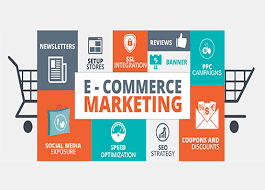The Role of Search Engine Marketing (SEM) in Digital Marketing
Search Engine Marketing (SEM) plays a crucial role in the world of digital marketing. It encompasses various strategies aimed at increasing a website’s visibility on search engine results pages through paid advertising.
One of the key components of SEM is Pay-Per-Click (PPC) advertising, where advertisers bid on specific keywords relevant to their target audience. When users search for these keywords, ads are displayed prominently on search engine results pages, driving traffic to the advertiser’s website.
SEM allows businesses to reach a highly targeted audience based on their search intent. By leveraging SEM tactics, companies can increase brand awareness, generate leads, and drive conversions effectively.
Furthermore, SEM provides valuable insights into consumer behavior and preferences through data analytics. By analyzing metrics such as click-through rates, conversion rates, and return on investment (ROI), marketers can optimize their SEM campaigns for better performance.
In today’s competitive digital landscape, having a strong SEM strategy is essential for businesses looking to stand out online. By investing in SEM tactics, companies can enhance their online presence, reach potential customers at the right moment, and achieve measurable results that contribute to their overall marketing objectives.
In conclusion, SEM is a powerful tool that complements other digital marketing efforts and helps businesses achieve their goals in an increasingly digital world.
Top 5 Advantages of SEM in Digital Marketing: Targeted, Visible, Measurable, Flexible, and Cost-Effective
- Highly targeted advertising to reach specific audiences
- Immediate visibility on search engine results pages
- Measurable and trackable results for campaign performance
- Ability to adjust campaigns in real-time based on data analytics
- Cost-effective compared to traditional advertising channels
5 Drawbacks of SEM in Digital Marketing: High Costs, Ad Blindness, Click Fraud, Short-Term Gains, and Complexity
Highly targeted advertising to reach specific audiences
Search Engine Marketing (SEM) in digital marketing offers the significant advantage of highly targeted advertising, allowing businesses to reach specific audiences with precision. By leveraging SEM tactics such as Pay-Per-Click (PPC) advertising and keyword targeting, companies can tailor their campaigns to reach users based on their search intent and behavior. This level of specificity ensures that marketing messages are delivered to the right audience at the right time, increasing the likelihood of engagement and conversions. Overall, the ability to target specific audiences through SEM enhances campaign effectiveness and maximizes ROI for businesses seeking to connect with their ideal customers online.
Immediate visibility on search engine results pages
One significant advantage of Search Engine Marketing (SEM) in digital marketing is the immediate visibility it provides on search engine results pages. Through paid advertising and strategic keyword targeting, businesses can ensure that their ads appear prominently when users search for relevant terms. This instant visibility helps companies reach their target audience quickly and effectively, driving traffic to their website and increasing brand awareness in a competitive online environment.
Measurable and trackable results for campaign performance
One significant advantage of Search Engine Marketing (SEM) in digital marketing is its ability to provide measurable and trackable results for campaign performance. Through the use of analytics tools and data tracking mechanisms, marketers can accurately monitor the effectiveness of their SEM campaigns in real-time. This level of transparency allows businesses to assess the impact of their advertising efforts, track key performance indicators, and make informed decisions to optimize their strategies for better outcomes. The ability to measure and track results ensures that resources are allocated efficiently, leading to improved ROI and overall campaign success.
Ability to adjust campaigns in real-time based on data analytics
The ability to adjust campaigns in real-time based on data analytics is a significant advantage of Search Engine Marketing (SEM) in digital marketing. By closely monitoring key performance indicators such as click-through rates, conversion rates, and cost per acquisition, marketers can make informed decisions on the fly to optimize their SEM campaigns for better results. This real-time adjustment capability allows businesses to stay agile and responsive to changing market dynamics, ensuring that their advertising efforts remain effective and efficient in reaching their target audience.
Cost-effective compared to traditional advertising channels
Search Engine Marketing (SEM) offers a significant advantage in digital marketing by being cost-effective compared to traditional advertising channels. With SEM, businesses have the flexibility to set budgets based on their specific needs and only pay when users engage with their ads. This pay-per-click model ensures that companies are getting value for their money by targeting audiences actively searching for their products or services. By optimizing ad campaigns and monitoring performance metrics, businesses can maximize their return on investment and achieve better results at a lower cost compared to traditional advertising methods.
1. Costly
SEM campaigns can present a significant challenge for small businesses with constrained budgets due to their costly nature, particularly when targeting competitive keywords. The bidding process for popular search terms can quickly drive up the cost of running SEM campaigns, making it financially burdensome for businesses operating on limited resources. This financial barrier often restricts smaller companies from fully leveraging the benefits of SEM, hindering their ability to compete effectively in the digital marketing landscape.
2. Ad Blindness
Ad blindness poses a significant challenge in Search Engine Marketing (SEM) campaigns. As users are exposed to an increasing number of ads online, they may develop a tendency to overlook or ignore paid search results altogether. This phenomenon diminishes the impact and effectiveness of SEM efforts, as the intended audience may not engage with the ads even if they are relevant to their search queries. Marketers must find innovative ways to combat ad blindness by creating compelling and engaging ad content that resonates with users and captures their attention amidst the digital noise.
3. Click Fraud
One significant drawback of Search Engine Marketing (SEM) is the issue of click fraud. This unethical practice involves competitors or malicious entities clicking on ads with the intention of exhausting a company’s advertising budget, without any genuine interest in the product or service being promoted. Click fraud not only wastes resources but also distorts campaign performance metrics, leading to inaccurate data analysis and potentially impacting the overall effectiveness of SEM strategies. Businesses must remain vigilant and implement measures to combat click fraud to ensure that their SEM campaigns yield genuine engagement and meaningful results.
4. Limited Long-Term Benefits
One significant drawback of Search Engine Marketing (SEM) in digital marketing is its limited long-term benefits. While SEM campaigns can deliver immediate results by driving traffic to a website, these benefits are often short-lived. Unlike Search Engine Optimization (SEO) efforts that can generate organic traffic over time and have a lasting impact, SEM results tend to cease once the campaign concludes. This means that businesses relying solely on SEM may struggle to maintain consistent online visibility and traffic growth in the long run without ongoing investment in paid advertising.
5. Complexity
One significant drawback of Search Engine Marketing (SEM) in digital marketing is its complexity. Running successful SEM campaigns demands a high level of expertise and continuous monitoring to fine-tune performance and maximize results. This complexity can pose a challenge for inexperienced marketers who may struggle to navigate the intricacies of keyword research, bidding strategies, ad copy optimization, and data analysis required for effective SEM campaigns. Without the necessary skills and experience, marketers may find it daunting to keep up with the ever-evolving landscape of SEM, leading to suboptimal campaign outcomes and potential wasted resources.




